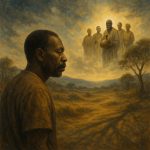Article Marking My Birthday – 27 July 2025
WHY I DON’T HAVE A STRONG AFFINITY TOWARDS CONSTITUTIONALLY CREATED CULTURAL INSTITUTIONS IN UGANDA
By Oweyegha-Afunaduula
Conservation Biologist,
Center for Critical Thinking and Alternative Analysis
In Uganda, kings were traditionally political figures, not cultural or spiritual ones. In functioning kingdoms, culture is typically rooted in clans, each with its own political head, cultural leader, and spiritual guide.
The 1995 Constitution of Uganda did not restore kings or kingdoms; it introduced a new, somewhat deceptive category called “cultural heads.” These so-called cultural heads were stripped of political power and authority, even though they are often the same individuals who once ruled as kings.
Many of their followers still perceive them as kings, despite the absence of any real political influence. This rebranding of former kings as mere cultural heads has had far-reaching effects: it is steadily eroding the cultural and spiritual fabric of Uganda’s indigenous communities.
Without political power or authority, these cultural heads are limited in their ability to protect the identity and sense of belonging of their people. This identity is further threatened by land grabbing, which uproots indigenous populations from their ancestral biocultural landscapes, along with the ecosystems and agroecological systems they have long sustained.
As a result, indigenous communities are being rendered vulnerable and disempowered, often becoming subjects of external groups with no historical or cultural ties to the land.
For God and My Country.
This post was created with our nice and easy submission form. Create your post!








